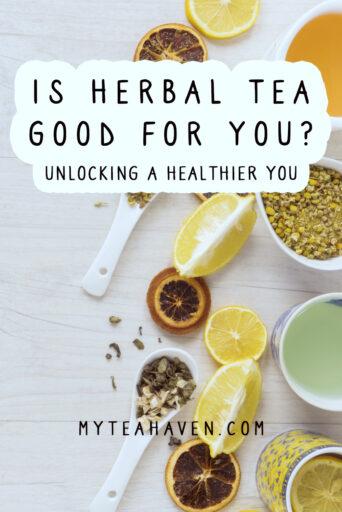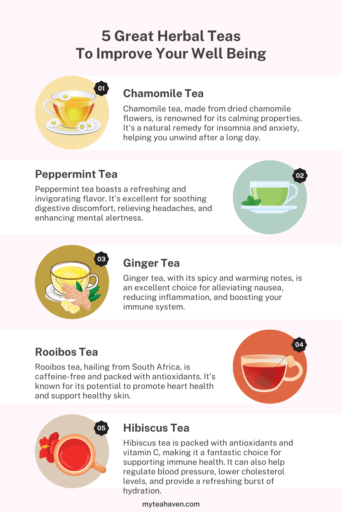Is Herbal Tea Good for You? Unlocking a Healthier You
Herbal tea, often referred to as tisane, has been cherished for centuries for its delightful flavors and numerous health benefits. Today I’m excited to share with you the wonders of herbal infusions and how they can positively impact your well-being.
We are a participant in the Amazon Services LLC Associates Program, an affiliate advertising program designed to provide a means for us to earn fees by linking to Amazon.com and related sites. This post may contain affiliate links which means we may receive a commission, at no cost to you, for purchases made using our links. Please see my disclosure to learn more. Unless otherwise stated, all prices are in US$.

What is Herbal Tea?
Before we get into the benefits, let’s clarify what herbal tea actually is. Unlike traditional tea, which is made from the leaves of the Camellia sinensis plant, herbal teas are crafted from a variety of dried herbs, fruits, flowers, and spices. These diverse ingredients contribute to a wide range of flavors and therapeutic properties.
A Rich History
The history of herbal tea is rich and culturally diverse. Ancient civilizations, including the Chinese and Egyptians, have been using herbs and plants to brew medicinal infusions for thousands of years. This historical background underscores the enduring appeal of this unique type of tea.
Varieties of Herbal Teas
Chamomile Tea
Chamomile tea, made from dried chamomile flowers, is renowned for its calming properties. It’s a natural remedy for insomnia and anxiety, helping you unwind after a long day.



Peppermint Tea
Peppermint tea boasts a refreshing and invigorating flavor. It’s excellent for soothing digestive discomfort, relieving headaches, and enhancing mental alertness.



Ginger Tea
Ginger tea, with its spicy and warming notes, is an excellent choice for alleviating nausea, reducing inflammation, and boosting your immune system.



Rooibos Tea
Rooibos tea, hailing from South Africa, is caffeine-free and packed with antioxidants. It’s known for its potential to promote heart health and support healthy skin.



Health Benefits of Herbal Tea
Relieves Stress and Anxiety
One of the most significant advantages of herbal tea is its ability to calm the mind and reduce stress and anxiety. Ingredients like chamomile and lavender contain natural sedatives that promote relaxation.

Helps Digestion
Many herbal teas, such as peppermint and ginger, are renowned for their digestive benefits. They can alleviate indigestion, bloating, and stomach discomfort, making them ideal after a heavy meal.
Boosts Immunity
Herbal teas like echinacea and elderberry are packed with immune-boosting compounds. Regular consumption can help your body fend off illnesses more effectively.
Promotes Healthy Skin
Herbal teas are rich in antioxidants, which combat free radicals and promote healthier, more radiant skin. Rooibos, in particular, is known for its skin-friendly properties.
Choosing the Right Herbal Tea
Selecting the right herbal tea for your needs is crucial. Consider your taste preferences and specific health goals when choosing from the wide array of available options.
Are There Any Side Effects?
While herbal teas are generally safe, it’s essential to be aware of potential side effects and consult with a healthcare professional if you have specific health concerns or are taking medications.
A Few Final Thoughts
Herbal tea is not only a delightful and diverse beverage but also a fantastic addition to a healthy lifestyle. Its numerous health benefits, ranging from stress relief to digestive aid and immune support, make it a valuable choice for tea enthusiasts and health-conscious individuals alike. So, why not brew yourself a comforting cup of herbal tea and savor both the flavor and well-being it offers?
Some Questions You Might Have
- Can herbal tea replace water in my daily hydration?
Herbal tea can contribute to your daily hydration, but it should not entirely replace regular water, which remains essential for overall health.
- How many cups of herbal tea can I safely consume in a day?
The safe consumption of herbal tea varies from person to person. As a general guideline, moderate consumption (2 to 3 cups per day) is typically considered safe for most individuals.
- Are there any herbal teas I should avoid during pregnancy?
Pregnant individuals should avoid certain herbal teas, such as those containing caffeine or herbs like black and blue cohosh, as they can have adverse effects.
- Can children drink herbal tea?
Herbal teas that are caffeine-free and gentle in nature can be suitable for children in moderation. Always consult with a pediatrician if you have concerns.
- Can herbal tea help with headaches?
Herbal teas like peppermint and ginger may provide relief from headaches due to their soothing and anti-inflammatory properties.





